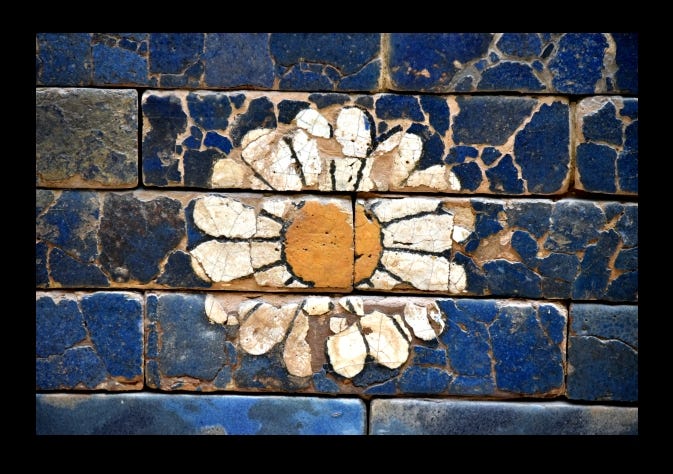ESSAY #8: God Is a Flower in the Kingdom of the Grass-Eaters
The Gods of the Future Will Be Machines, Part 5

But now ask the animals and they will teach you,
or the birds of the sky and they will tell you,
or speak to the Earth and it will teach you:
In His hand is the life of every creature,
and the breath of all the human race.
– the Book of Job (12:7-8,10)
Look closely at the lilies of the field, how they grow.
Yeshua of Nazareth
If you understand the spirit of a single flower, you understand everything.
Masonobu Fukuoka, Sowing Seeds in the Desert
The bard of the Mossy Face of Christ,
said recently in The Sun From Which I See that “Christianity has forgotten it's a dream”—and that's true, profoundly true: It's a visionary, poetic, mystical, imaginal, metaphorical, apocalyptic, right hemispheric, earthy and ancient greenman watching of the shrouded Holy One, Lord of the Cedars, come to chant psalms and drink and break bread, to bleed and laugh and weep, to sing hymns and dance and shatter his body of clay for all the lost children of the world, carrying them on his shoulders up to his Father in the sky.But Christianity is also a hardcore commitment to reality—and it's forgotten that, too.
They go together, the dream-dimensions of Christianity and the dimensions of clay, sunlight, water, and bodily pain—lose one, lose the other; let them untangle, unravel from one another and what's left is an overly literal, but somehow still abstract, empty religion of nonsense which doesn't seem to know what either Earth or the human body are for.
But keep them alive and entangled, and you get the lush, bewildering and wondrous Christianity of this crazy story in The Northern Thebaid, a collection of stories, all totally berserk, of the forest-dwelling saints of Holy Russia:
I went far away from the monastery and, having lost the road, I wandered lost without food or drink. Suddenly in the distance there appeared to me, as it were, the shadow of a man. I went towards it, and the shadow hid in the denseness of the forest. I continued to run and I saw a small path, and I went on it as far as a very dense thicket in which there was a narrow entrance just large enough for one man. Having gone through this entrance, I saw a mountain, and on it the footprints of a barefoot man. In the cliff there was a small opening. I prayed and then entered the dark cave...In the cave there were four stumps; on them were placed two boards and two carved wooden bowls; in one of the bowls was water, and in the other, dried grass.
The cave-dweller, Andrew, then offers the teller of this story some of his water and dried grass, which refreshes him, to his astonishment. And then Andrew recounts all the wounds he'd suffered from wilderness combat: wars against the ego, wars against his own thoughts, wars against isolation and despair, wars against hunger and thirst and rain—until, after many years of this, a “certain holy being” appeared and granted him a gift:
'He gave me this grass, saying, “Eat it, and drink water from this lake.” So for 38 years I have eaten this grass.'
Doesn't get much more badass than eating dried grass and drinking water from a lake.
Doesn't get much more archetypical, radiantly dreamlike, lyrical, and symbolic, either.




